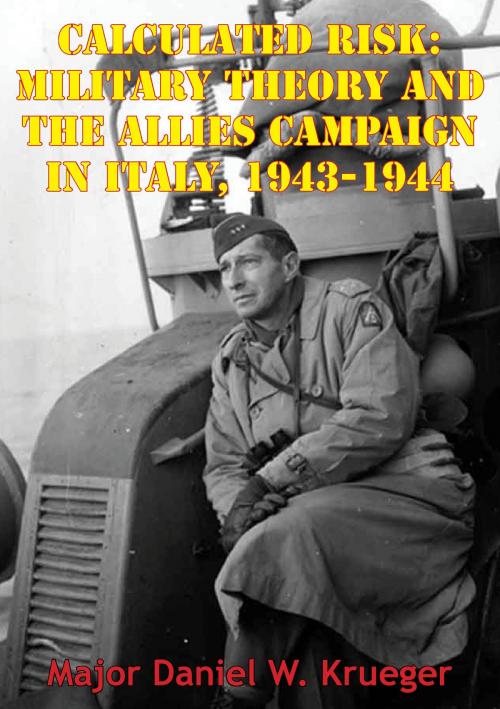Calculated Risk: Military Theory And The Allies Campaign In Italy, 1943-1944
Nonfiction, History, Germany, European General, Military, United States| Author: | Major Daniel W. Krueger | ISBN: | 9781786250636 |
| Publisher: | Lucknow Books | Publication: | November 6, 2015 |
| Imprint: | Lucknow Books | Language: | English |
| Author: | Major Daniel W. Krueger |
| ISBN: | 9781786250636 |
| Publisher: | Lucknow Books |
| Publication: | November 6, 2015 |
| Imprint: | Lucknow Books |
| Language: | English |
In September 1943 allied armies of the United States and Great Britain landed on the European mainland in its “soft underbelly” taking another step toward the defeat of Nazi Germany. Expecting to be in Rome by the end of that year, the Allies instead found themselves embroiled in a prolonged struggle of static warfare reminiscent of the western front of 1915-16. In the end the allied armies suffered 312,000 casualties in a campaign whose purpose was not clearly decided. This monograph examines the Allies campaign in the Mediterranean in 1943-1944 in order to answer the question of whether the Allies could have “won” and, if so, how. More specifically, this study looks at the utility of military theory for explaining cause and effect, and for providing a basis for operational insight and assessment of risk. This particular historical case study is significant in that the challenges of difficult terrain, coalition command, multinational forces, limited resources, and bad weather faced by the operational commanders of this campaign are factors that may weigh heavily for operational commanders in future conflicts.
Conclusions reached in this study are threefold. First, the operational commanders involved did not have a true appreciation of the operational risks taken when major operations were designed and executed in January 1944. Second, the operational and strategic commanders may have chosen a different course of action if these risks had been more fully appreciated. Third, classical theory, as represented by the writings of Clausewitz, Jomini, and even Liddell Hart, does have utility in explaining cause and effect and may well have provided the commanders concerned in this case clearer insight at the operational level of war.
In September 1943 allied armies of the United States and Great Britain landed on the European mainland in its “soft underbelly” taking another step toward the defeat of Nazi Germany. Expecting to be in Rome by the end of that year, the Allies instead found themselves embroiled in a prolonged struggle of static warfare reminiscent of the western front of 1915-16. In the end the allied armies suffered 312,000 casualties in a campaign whose purpose was not clearly decided. This monograph examines the Allies campaign in the Mediterranean in 1943-1944 in order to answer the question of whether the Allies could have “won” and, if so, how. More specifically, this study looks at the utility of military theory for explaining cause and effect, and for providing a basis for operational insight and assessment of risk. This particular historical case study is significant in that the challenges of difficult terrain, coalition command, multinational forces, limited resources, and bad weather faced by the operational commanders of this campaign are factors that may weigh heavily for operational commanders in future conflicts.
Conclusions reached in this study are threefold. First, the operational commanders involved did not have a true appreciation of the operational risks taken when major operations were designed and executed in January 1944. Second, the operational and strategic commanders may have chosen a different course of action if these risks had been more fully appreciated. Third, classical theory, as represented by the writings of Clausewitz, Jomini, and even Liddell Hart, does have utility in explaining cause and effect and may well have provided the commanders concerned in this case clearer insight at the operational level of war.

![Cover of the book Love Letters From An Anzac [Illustrated Edition] by Major Daniel W. Krueger](https://www.kuoky.com/images/2014/august/300x300/9781782892571-pKQI_300x.jpg)

![Cover of the book The Last Four Months; How the War Was Won [Illustrated Edition] by Major Daniel W. Krueger](https://www.kuoky.com/images/2015/november/300x300/9781786255471-v8rO_300x.jpg)




![Cover of the book U.S. Army Special Operations In World War II [Illustrated Edition] by Major Daniel W. Krueger](https://www.kuoky.com/images/2014/august/300x300/9781782894537-8CEN_300x.jpg)





![Cover of the book 48 Million Tons To Eisenhower: The Role Of The SOS In The Defeat Of Germany [Illustrated Edition] by Major Daniel W. Krueger](https://www.kuoky.com/images/2015/november/300x300/9781786257666-m0lC_300x.jpg)
